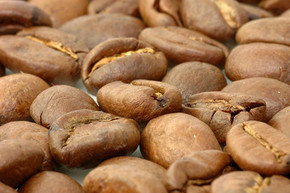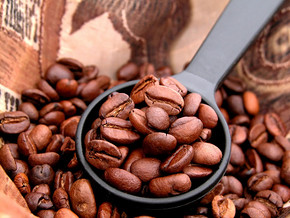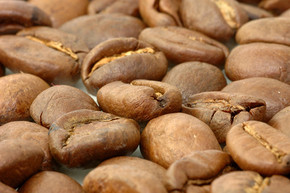What is 100% Arabica Coffee?
Pay attention to coffee reviews (Weixin Official Accounts vdailycom ) and find a beautiful cafe to open your own shop
When we drink coffee, most of the time it is because of the need for caffeine pick-me-up, and we rarely care or don't know the difference between coffee and beans, let alone the huge difference in flavor and taste.
Only in advertisements can you hear the slogan "Arabica coffee". There are many people who don't understand what this word means.
Our subconscious mind has bound the caffeine and pick-me-up effects of coffee tightly together, quickly replenishing the energy we need in the morning.

However, for the more discerning coffee lover, the image of good coffee must not be a coffee shop that only provides coffee beans and caffeine, and the representative of "100% Arabica" coffee also has a grade distinction.
Coffee has three native species: Arabica, Robusta, Liberica, because of flavor and planting reasons, the market circulation of coffee only the first two, Arabica and Robusta, market share is almost 73 open.
These three native species have been spread to different places around the world, producing different flavor changes. Just like apples, apples in each province in China have different flavors and varieties, and there are great differences between domestic and foreign apples.
Caffeine content comparison
Arabica contains roughly half as much caffeine as Robusta and has a significant advantage over Robusta in flavor and texture.
People should be more conservative until they know how they react to caffeine, and the safe dose varies with age, not just because arabica has less caffeine than robusta.
Comparison of two flavors
Arabica is often considered a "high quality" coffee bean because of its rich flavor and lack of the intense bitterness of Robusta beans. Many producers label their roasted coffee beans as 100% Arabica to highlight their quality.
Arabica coffee produced in different regions, at different altitudes and in different climates usually has its own characteristics and can show very different regional personality flavors. Fruity aromas and caramel sweetness after proper roasting. In most cases, it has better aroma and flavor than Robusta beans.
Robusta usually has a dull and pungent flavor. Most of them are planted in low altitude areas. The flavor differences produced by different regions and different climates are not too large, and they lack regional personality. Robusta's medium-to-low value beans often taste rubber-tire after deep roasting, and it is difficult to show detailed flavor.
The fussy degree of planting environment determines the difference of flavor, which also dominates the market use of the two species.
Different functions, not completely good or bad
Of course, this description is not to belittle Robusta beans, but different uses, Italian blend coffee beans mostly inseparable from Robusta thick fat support, he accounts for 25% of global coffee production, still can not be underestimated, and pest resistance beneficial to cultivation.
The prestigious "Blue Mountain" and "Rose Summer" are outstanding representatives, fruit acid, bitter taste of dark chocolate, jasmine fragrance, red wine, dark plum, sweet taste of honey... Both are descriptive words used to describe Arabica flavor, which shows how much we like Arabica's rich and varied aroma and taste.
They all have a place in the industry.
Whether it's single-serve coffee or blend coffee, and Robusta doesn't mean bad taste. Higher varieties of Robusta taste much better than low-end Arabica, but they need extra care in growing and roasting.
Robusta also has benefits.
Robusta is particularly high in antioxidants, which help relieve oxidative stress. Oxidative stress is caused by free radicals that can damage the body's immune system. This is generally very good for your health.
Robusta beans are also thought to have the potential to fight cancer because they reduce the damage of this stress, only possibly because physical differences and excessive drinking can also cause physical discomfort.
Therefore, Arabica and Robusta are just the names of coffee varieties, and their natural and artificial variations in global origins are very large and interesting, giving us more fun and enjoyment for coffee taste buds.
Important Notice :
前街咖啡 FrontStreet Coffee has moved to new addredd:
FrontStreet Coffee Address: 315,Donghua East Road,GuangZhou
Tel:020 38364473
- Prev

Brief introduction of Arabica coffee beans, how to brew Arabica coffee powder
Follow the caf é (Wechat official account vdailycom) found that the beautiful cafe opened a small shop of Arabica coffee beans brief introduction to Arabica coffee beans (Coffea arabica), the origin of Arabica species is Ethiopia's Abyssinia Plateau (Abyssinia, now known as the Ethiopian Plateau), in the early days, it was mainly eaten as medicine (Islamic monks used as a secret medicine to cure body and mind.
- Next

Introduction to the hometown of Arabica Coffee and Ethiopia Coffee
Following caf é (Wechat official account vdailycom) found that Beautiful Caf é opened a small shop of its own Ethiopia is the hometown of Arabica coffee, it is in the forests of the Kaffa region that you can see wild Arabica coffee. In Ethiopian, coffee is called Bun or Buna, and coffee beans (coffeebean) may be turned from Kaffa Bun
Related
- Detailed explanation of Jadeite planting Land in Panamanian Jadeite Manor introduction to the grading system of Jadeite competitive bidding, Red bid, Green bid and Rose Summer
- Story of Coffee planting in Brenka region of Costa Rica Stonehenge Manor anaerobic heavy honey treatment of flavor mouth
- What's on the barrel of Blue Mountain Coffee beans?
- Can American coffee also pull flowers? How to use hot American style to pull out a good-looking pattern?
- Can you make a cold extract with coffee beans? What is the right proportion for cold-extracted coffee formula?
- Indonesian PWN Gold Mandrine Coffee Origin Features Flavor How to Chong? Mandolin coffee is American.
- A brief introduction to the flavor characteristics of Brazilian yellow bourbon coffee beans
- What is the effect of different water quality on the flavor of cold-extracted coffee? What kind of water is best for brewing coffee?
- Why do you think of Rose Summer whenever you mention Panamanian coffee?
- Introduction to the characteristics of authentic blue mountain coffee bean producing areas? What is the CIB Coffee Authority in Jamaica?

